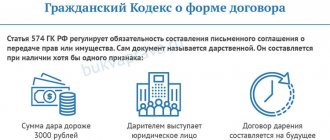Legal regulation of the mortgage agreement and its subject matter
A specific feature of DI lies, among other things, in its subject matter.
It is real estate or rights to real estate (that is, a mortgage can be given, for example, a lease right). As a rule, the largest transactions are secured by mortgage by virtue of an agreement. Legal regulation of DI is carried out by the Law “On Mortgage (Pledge of Real Estate)” dated July 16, 1998 No. 102-FZ (hereinafter referred to as Law No. 102), taking into account the general norms of the Civil Code of the Russian Federation on collateral (Articles 334–358.18).
So, the subject of DI may be:
- land plot;
- residential and non-residential premises, building, structure;
- apartment;
- lease right;
- the right to claim under a share participation agreement in construction;
- unfinished construction project;
- other real estate objects (clause 1 of article 130 of the Civil Code of the Russian Federation).
When concluding a mortgage agreement, you should pay attention to the clear designation of the subject of the mortgage, indicating all the characteristics that allow it to be accurately identified (Clause 2, Article 9 of Law No. 102). A mandatory requirement of the law is an indication of the basis for the ownership of the object by the pledgor, as well as the existence of state registration of the pledgor’s right to it. This is due to the security function of the pledge (if the property does not belong to the mortgagor legally, then the pledge will not fulfill its function).
Mortgage of property withdrawn from circulation is prohibited (Clause 2, Article 6 of Law No. 102).
An important, albeit temporary, innovation in the regulation of mortgage agreements is the introduction by the Russian government of a rule on the mandatory provision of mortgage holidays at the request of a borrower who has lost a significant part of his income. For more details, read the article “At what mortgage size can you go on a credit holiday.”
Sberbank mortgage application form 2021
Sberbank's mortgage application form is characterized by the following criteria:
- reliability and relevance of the information filled in;
- accuracy regarding the parameters of the requested loan;
- honesty on the part of the client;
- willingness to provide information about the employer and immediate family.
Each client applying for a mortgage fills out a unique form consisting of several blocks. You can receive the form in two ways: print it yourself from the official Sberbank website or contact the nearest service office.
Let's look at a sample form and an example of filling it out in detail.
Download a blank form in Word
The application form for a Sberbank mortgage in Word format allows you to fill out the required data and, if necessary, make prompt adjustments.
You can download a blank form from this link.
Sample and example of filling
The application form for a Sberbank mortgage is filled out:
- with your own hand with a blue/black pen – carefully, without errors or corrections;
- in printed format.
The borrower will need to indicate:
- personal data (full name (if changing surname, indicate the previous surname and reason), date of birth, TIN);
- passport information;
- Family status;
- contacts (current phone number);
- education;
- registration address (there must be a corresponding mark in the passport) + actual location address;
- information about the work (name of the employing company, its details, number of employees, type of activity, position, length of service);
- level of monthly income and expenses (both documented and unofficial income of the client are indicated);
- information about the client’s own property (real estate, transport);
- information about the requested loan (amount, term, purpose of lending, parameters of a potential property, availability of special conditions/promotions, cost of housing, method of issuing a loan);
- SNILS;
- presence/absence of a salary card or other Sberbank accounts.
IMPORTANT! It is recommended to indicate in the application the amount of the loan (mortgage) that is slightly more than required, since there is a tendency for it to decrease slightly after approval of the mortgage application by Sberbank.
After filling out, the client puts the date, his signature and agrees to the processing of personal data.
NOTE! It is possible for a third party to fill out the form with the consent of the potential borrower, but the signature must be affixed exclusively by the client himself.
In order to avoid mistakes, typos and not get confused when filling out a rather lengthy application, you should carefully study the sample application form and all the available nuances.
You can download the completed application form here.
Features of a mortgage by virtue of an agreement for certain types of real estate
Let's consider what property can be the subject of a mortgage and what are the features of its registration in specific cases:
- The subject of DI can only be an independent real estate object that has boundaries, cadastral number and name, registered in the Unified State Register. Parts of premises, land plots, etc. cannot be the subject of DI (Clause 4, Article 5 of Law No. 102).
- If the subject of the mortgage under a pledge agreement is an apartment or other premises, then a share in the right of common ownership of the common property of an apartment building and/or land plot is also automatically pledged, even if the agreement does not contain such a condition (Article 75 of Law No. 102 ).
- Property that is in common joint ownership may be the subject of a mortgage only with the written consent of all co-owners. In the case of common shared ownership, such consent is not required. The owner of a share has the right to pledge it independently, without obtaining the consent of co-owners (Article 7 of Law No. 102).
What other documents will be needed?
In addition to the completed mortgage application form for Sberbank, employees request the following set of required papers from a potential borrower:
- Russian Federation passport with registration.
- Documents for the property being purchased (if the property has already been found).
- Documents confirming labor activity (GPA, work book, contract).
- Documents proving receipt of sufficient income (certificate in the form of a bank or 2-NDFL, an extract from a pension account or card).
Sberbank provides the opportunity to submit a mortgage application using two documents, providing only a Russian passport and a second document of the client’s choice (usually SNILS or INN). There is also a simplified mortgage for Sberbank salary clients.
The above list of documentation is standard, however, Sberbank reserves the right to request other documents that, if necessary, will help in a detailed assessment of the client’s solvency and his financial rating. You can read more about the documents for a Sberbank mortgage in a special post.
Property valuation as an essential condition of a mortgage agreement
A mortgage agreement can be concluded only if the parties agree on all its essential terms. In addition to the subject, such conditions of DI also include its assessment (Clause 1, Article 9 of Law No. 102). The parties to the DI must evaluate the property by agreement between themselves and indicate its value in monetary terms. The amount of recovery in case of failure to fulfill the main obligation depends on compliance with this condition.
Important! Parties may specify multiple estimates in the DI for different purposes, for example:
- assessment of technical inventory bodies - for the purposes of calculating state duty;
- assessment by an independent appraiser - for comparison with existing prices on the market;
- collateral assessment.
In this case, only the collateral assessment established by agreement of the parties will be of key importance for the DI. The DI must clearly indicate that this particular assessment is established for the purposes of a mortgage (see paragraph 19 of the Review of Judicial Practice of the Supreme Court of the Russian Federation No. 5 (2017).
If the subject of the DI is an unfinished construction project that is in state or municipal ownership, the valuation for the purposes of the DI is the assessment of the market value (paragraph 4, clause 3, article 9 of Law No. 102).
The essence of the main obligation as an essential condition of the real estate pledge agreement
A CI is meaningless without reference to the underlying obligation that the mortgage secures. The pledge agreement must indicate the essence of the secured agreement, the terms of execution and the amount, the procedure for settlements (Clause 1, Article 9 of Law No. 102).
By virtue of an agreement, a mortgage can be used to secure obligations arising from:
- from the loan agreement;
- loan agreement;
- purchase and sale agreements;
- lease agreements, contracts, etc.
- causing harm.
As for the amount of the main obligation, there are 2 options:
- The DI indicates the firm amount of the pledgee's claims secured by the pledge. In this case, the mortgagee does not have the right to demand foreclosure on the pledged property beyond this amount, except for compensation of the mortgagee’s legal costs, expenses for the sale of property, as well as additional expenses of the mortgagee (Article 4 of Law No. 102).
- The DI lists those requirements that are secured by the mortgage under this agreement. A possible list of such requirements is contained in paragraph 1 of Art. 3 of Law No. 102.
What should a borrower pay attention to?
The preparation of such a document is a complex procedure that includes many important details. When signing a mortgage agreement, the borrower should pay special attention to :
- The full cost of the loan.
- A system for calculating future payments.
- Information about mortgage collateral.
- The essence of fulfilling the main financial obligation.
- Rights and obligations of each party.
- Validity period of the document.
- Penalties.
- Estimated value of the collateral.
- Termination of the contract early.
- Renting real estate with collateral.
- Grounds due to which an agreement may lose legal force.
If the borrower pays due attention, he can avoid many problems and delays in the future.
Read more about what a mortgage agreement is and what you should pay attention to when drawing it up here.
Possible terms of the mortgage agreement. Subsequent mortgage
In addition to the essential conditions, the parties, at their discretion, have the right to provide for the following conditions in the DI:
- Possibility of foreclosure on the collateral out of court.
- The procedure for the sale of pledged property in the event of foreclosure on it by a court decision.
- Mortgage clause.
- Condition on the possibility of a subsequent mortgage.
Important! If the mortgagor transfers the property into a subsequent mortgage in violation of the prohibition established by the DI, the subsequent mortgage agreement may be declared invalid by the court at the claim of the first mortgagee.
It does not matter whether the second mortgagee knew about the existence of the original DI or not. The previous mortgagee must prove that the subsequent mortgage violated his rights (see the decision of the Kuibyshevsky District Court of St. Petersburg dated October 23, 2017 in case No. 2-5811/2016).
Sberbank interest rates on mortgages today
Most of Sberbank's mortgage products are characterized by favorable interest rates, ongoing discounts, promotions and special offers from the lender's leading partners. The level of loan rates for mortgage programs is presented in the table below.
| Programs | Maximum amount, thousand rubles. | Bid, % | Duration, years | Down payment | Note |
| Ready housing | 15 000 | 8,2 | 30 | 15 | +0.4% if PV is from 15-20%, + 0.5% if there is no Sberbank salary card, + 1% if insurance is refused; +0.8% on a mortgage according to two documents: + 0.3% if you refuse to purchase an apartment through the domclick website; + 0.3% if you refuse electronic registration; Young family promotion - base rate 7.8% |
| Construction | up to 85% of the property value | 8,1 | 30 | 15 | +0.4% if PV is from 15-20%, + 0.5% if there is no Sberbank salary card, + 1% if insurance is refused; +0.3% for a mortgage on two documents: + 0.3% if electronic registration is refused. |
| Construction of a residential building | up to 75% of the value of the collateral | 9,3 | 30 | 25 | +0.5% if the borrower does not receive salary on a Sberbank card; +1% in the absence of a life insurance policy; +1% if the mortgage is issued after registration of the property with the Rosreestr authorities |
| country estate | up to 75% of the value of the collateral | 8,5 | 30 | 25 | +0.5% if the borrower does not receive salary on a Sberbank card; +1% in the absence of a life insurance policy; +1% if the mortgage is issued after registration of the property with the Rosreestr authorities |
| Military mortgage | 2 788 | 8,4 | 20 | 20 | |
| Non-targeted loan secured by real estate | up to 60% of the cost | 11,3 | 20 | + 0.5% - if not a salary employee; + 1% - if you refuse life insurance. | |
| Mortgage for garage and parking space | 9 | 30 | 25 | + 0.5% if not a salary project, + 1% if insurance is refused. | |
| Family mortgage | up to 6 million in the regions and up to 12 million in Moscow, Moscow Region, St. Petersburg and Leningrad Region. | 4,7 | 30 | 20 | + 0.3 if you refuse electronic registration; + 1% when canceling life insurance. |
| Mortgage refinancing | 8,5 | 30 | |||
| Promotion “Your turnkey home” | up to 8,000,000 ₽ for properties in Moscow and the Moscow region up to 5,000,000 ₽ for properties in the Lipetsk region | 10,9 | 30 | 20 | Before registering a mortgage, the rate is 12.9% |
| Mortgage with state support 2020 | Moscow, Moscow Region and St. Petersburg and Leningrad Region up to 8 million rubles, regions up to 3 million. | 6,1 | 20 | 20 | + 0.3% if you refuse electronic registration of a transaction, + 1% if you refuse life insurance |
| Rural mortgage | Regions up to 3 million LR and Far East up to 5 million. Moscow, Moscow Region and St. Petersburg do not work | 2,7 | 25 | 15 | Temporarily suspended |
The table shows that the minimum interest (from 5) can be obtained as part of the program for purchasing housing in new buildings taking into account government subsidies, in individual residential complexes from Sberbank partner developers, or by obtaining a family mortgage.
The following surcharges may apply to base rates:
- +0.5 p.p. – for clients who do not receive their salary to a Sberbank account/card;
- + 0.2 p.p. – for a mortgage payment of less than 20%;
- + 0.3 p.p. – for refusing the “Showcase” campaign;
- +1 p.p. – when taking out only property insurance;
- +1 p.p. – until the property is encumbered in favor of the bank.
Mortgage agreement between individuals and legal entities. Rights and obligations of the parties
The parties to a real estate pledge agreement are the pledgor and the pledgee. Mortgage agreements between individuals are less common in practice than with the participation of credit institutions.
The pledgor can be a person who is or is not a party to the main obligation.
Under DI there is no alienation of property. The mortgagor remains the full owner, subject to certain restrictions. Yes, he:
- has the right to own, use, dispose of, and bequeath property;
- has the right to receive income from the use of the pledged property;
- is obliged to bear the burden of maintaining the subject of the mortgage, monitor its condition, and carry out repairs (Chapter 5 of Law No. 102).
However, the right of the pledgor to dispose of the pledged property is limited by the consent of the pledgee, unless otherwise established by the DI. The parties may also provide in the DI that the mortgagor is obligated to insure the property.
The pledgee has the following rights in relation to the pledged property:
- check the safety and condition of the property, and also demand early fulfillment of the main obligation if the mortgagor violates his obligations to maintain the property;
- receive priority over other creditors in satisfying the obligations secured by the mortgage at the expense of the pledged property.
A completed sample mortgage agreement can be downloaded from the link: Sample mortgage agreement.
Features of land mortgages
Separate chapter 11 of Law No. 102 regulates the pledge of land plots. The subject of a land plot mortgage agreement can only be plots that are not seized and not limited in circulation, and also have an area of at least the minimum size established by the laws of the constituent entities of the Russian Federation and regulations of local governments. The subject of the DI may also be the right to lease a land plot.
As a general rule, the pledge of a land plot also applies to all buildings located on this plot.
Important! This rule applies both to those objects that were already on the land plot at the time of the conclusion of the DI, and to those built during its validity period. In this case, it does not matter whether the ownership of the constructed object is registered (see paragraph 22 of the Review of Judicial Practice of the Supreme Court of the Russian Federation No. 5 (2017)).
A share in the right of common ownership of a land plot that is not allocated in kind cannot be the subject of a mortgage (Clause 2, Article 62 of Law No. 102). In addition, foreclosure on a land plot is possible only on the basis of a court decision (Article 278 of the Civil Code of the Russian Federation).
Features of a mortgage when buying an apartment
A sample agreement for the purchase of an apartment with a mortgage can be downloaded here: Agreement for the purchase and sale of an apartment with a mortgage.
The Mortgage Law also provides for special rules governing residential mortgages. At the same time, the concept of residential premises does not include hotels, garden houses, dachas and other premises not intended for permanent residence of citizens.
On this issue, the problem of foreclosure on mortgaged residential premises is of particular interest. Art. 446 of the Civil Code of the Russian Federation provides for a ban on foreclosure on residential premises, which are the only place for a citizen to live. However, the provisions of Art. 78 of Law No. 102 establishes an exception to this rule.
Foreclosing on a single residential premises is possible if it is the subject of a financial settlement that secures obligations under a loan agreement concluded for the purpose of acquiring this or other residential premises. These norms became the subject of consideration by the Constitutional Court of the Russian Federation (hereinafter referred to as the Constitutional Court of the Russian Federation) and were recognized as not contradicting the Constitution of the Russian Federation (see, for example, the determination of the Constitutional Court of the Russian Federation “At the request of the Sovetsky District Court of the city of Chelyabinsk to verify the constitutionality ..." dated January 17, 2012 No. 13- O-O).
The above exception does not apply to cases where residential premises are pledged as security for other obligations (for example, a loan for consumer needs). In such situations, foreclosure on the only residential premises cannot be taken.









